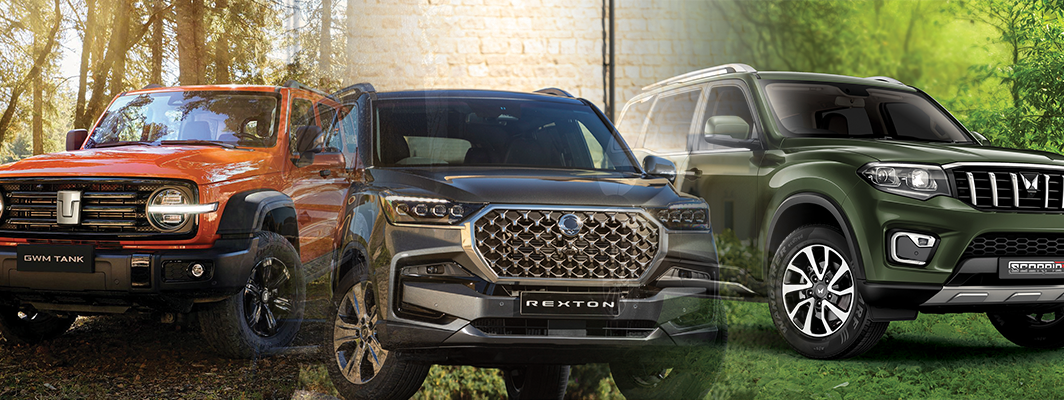As 4x4 wagon prices continue to skyrocket, Byron Mathioudakis reviews three affordable contenders for plumbers unbothered by badge or peer pressure.

The Contenders:
| GWM Tank 300 from $46,990 driveaway: Impressive in many areas | Mahindra Scorpio from $41,990 driveaway: More sophisticated than you’d think | SsangYong Rexton from $48,990 driveaway: When size and space matter most |
Globally the demand for fourwheel- drive (4WD) wagons has boomed in the past few years.
This unprecedented demand has resulted in inflated prices and long waiting lists, especially for Australia’s favourite body-on-frame, off-road SUV, the Toyota Prado.
You won’t find a new one for under $68,000 driveaway, and that’s for the basic GX five-seater. GWM, Mahindra and SsangYong, however, have other ideas. Each has a capable, yet civilised alternative, at a cheaper price and with a seven-year warranty.
Sure, their sizes, seating and towing capacities all vary, but they do offer Aussies good, old-fashioned choice.

Just released, the Tank 300 should remain in its current form for a few years yet, but the larger Tank 500 with three-row seating is expected from 2024.
GWM Tank 300 from $46,990 to $60,990 driveway
The smallest- and most striking - of the contenders is China’s GWM (Great Wall Motors) Tank 300.
While it might look like a cross between a 1990s Toyota LandCruiser and Mercedes-Benz G-Wagon, the spacious Tank 300 is startlingly modern inside.
Turbine-style dashboard vents and twin 12.3-inch electronic displays housing digital instruments and a multimedia touchscreen, reveal a strong Mercedes influence. With familiarisation, it mostly works fine, but can be distractingly fiddly when swiping sub-menus on the move.
All models include powered front seats, a sunroof, surround-view camera, side steps, roof rails and driver-assist safety tech like Autonomous Emergency Braking (AEB), lane alert and adaptive cruise control. But if you are looking for leather, heated/cooled front seats, wireless charging and a front differential lock, you’ll need the more-expensive Ultra.
While the Tank 300’s cabin storage, vision and ventilation rate highly, the front seats could offer more support, there’s no digital radio and the cargo area is small (though well finished).
Like most 4x4s, the GWM employs separate-chassis construction, with on-road, two-wheel drive, or high/low-range 4WD to keep up with LandCruisers when off-roading.
Yet the Tank 300 also shows a refined side too, offering soft suspension for a comfy ride, light controls for easy manoeuvrability around town, as well as pleasing highway agility… to a point.
The driver-assist safety tech needs better Australian-road tuning, as it’s way too reactive, with the adaptive cruise control braking prematurely too often or the lane-keep system being too prone to abrupt wheeltugging. Both can be alarming.
Additionally, the turbo petrol engine, while smooth and speedy off the line, needs to work hard at high revs out on the open road, or when fully laden, and that makes its initial throttle response sluggish when overtaking, as well as disappointingly thirsty.
Which is why the $10K-extra, 258kW/615Nm hybrid makes sense, with substantially stronger performance and better fuel economy at 8.4L/100km.
Either way, though, if you need a stylish off-roader that’s refined, easy and enjoyable to drive, the surprisingly likeable Tank 300 might have you covered.
TECHNICAL SPECIFICATIONS – GWM Tank 300 Lux from $46,990
| Engine | 2.0-litre 4-cylinder turbo petrol |
| Transmission | 8-speed automatic |
| Power | 162kW@ 5500rpm |
| Torque | 380Nm @ 1800-3600rpm |
| Kerb weight | 2155kg |
| Power-to-weight ratio | 75kW/tonne |
| Average fuel consumption | 9.5L/100km |
| CO2 | 221g/km (approx.) |
| Fuel tank | 75L |
| Warranty | 7-year/unlimited kilometres |
| Service interval | 12 months/10,000km (15,000km from 24 months) |
| Turning circle | 12.0 metres |
| Length/width/height/wheelbase | 4760/1930/1903/2750mm |
| Ground clearance | 224mm |
| Towing capacity braked/unbraked | 2500/750kg |
| Payload | 440kg |
| Cargo capacity (5-seat mode) | 400L |
| ANCAP rating (out of 5) | 5 |

The belated arrival of AEB and other driver-assist safety systems is pencilled in for 2025, and they cannot come soon enough.
Mahindra Scorpio from $41,990 to $45,990 driveaway
Mahindra of India has decades of expertise making cheap, rugged and reliable workhorse 4x4s. Now, with the intriguing Scorpio, it’s chasing the Land Rover’s Discovery.
Mahindra is the newest of the contenders, its neat - if narrow - styling evokes Prado as well as Volvo’s XC90.
Unexpectedly, the latter also informs the interior, with a vertical tablet-style touchscreen, Audi-esque analogue/digital
instrumentation dials and upmarket ambience. You’ll also find contrasting stitched leather trim, climate control, a sunroof and powered driver’s seat. Classy!
For now, the Scorpio is a spacious six-seater wagon - sadly not two rows with three-abreast seating, but four sumptuous and supportive individual bucket seats and a kids-only fold-and-tumble (but not stow-away), two-person bench in the large luggage area. When used this way, the 460L cargo capacity drops to being practically useless.
Staying on the downsides: there is no reach adjustability for the steering column, adaptive cruise control or DAB+ digital radio, and the glovebox and console storage are limited.
The biggest drawback however is the lack of driver-assist safety; AEB and related lane-alert/keep and blind-spot systems are not yet available. We’re no fans of the (thankfully switchable) stop-start system, which can sometimes cut engine power dramatically at restart for several seconds, leading to dangerously slow acceleration during that time. Turn it off!
Despite these setbacks, there’s much to recommend. The Scorpio’s diesel engine is powerful yet muted, with spirited acceleration and terrifically strong mid-range muscle, making it one of the best of its type.
And while the steering seems a little remote around town, the Mahindra handles and rides well enough, with a planted-to-the-bitumen feeling,
even at speed. There’s been some Australian road tuning and it shows.
Plus, the brand’s heritage and experience really shine off-road too.
Tough, powerful, comfortable, generously equipped and keenly priced, the Scorpio’s virtues are clear. It’s such a shame, then, that AEB isn’t yet available.
TECHNICAL SPECIFICATIONS – Mahindra Scorpio Z8 from $41,990
| Engine | 2.2-litre 4-cyl turbo diesel |
| Transmission | 6-speed automatic |
| Power | 129kW@ 3500rpm |
| Torque | 400Nm @ 1750-2750rpm |
| Kerb weight | 2085kg |
| Power-to-weight ratio | 61.8kW/tonne |
| Average fuel consumption | 7.2L/100km |
| CO2 | 190g/km |
| Fuel tank | 57L |
| Warranty | 7-year/150,000km |
| Service interval | 12 months/10,000km |
| Turning circle | 12.6 metres |
| Length/width/height/wheelbase | 4662/1917/1857/2750mm |
| Ground clearance | 227mm |
| Towing capacity braked/unbraked | 2500/750kg |
| Payload | 525kg |
| Cargo capacity (4-seat mode) | 460L |
| ANCAP rating (out of 5) | 5 |

SsangYong models tend to stay current for decades, but an all-electric family-sized SUV sibling alternative is expected within the next couple of years.
SsangYong Rexton from $48,990 to $59,990 driveaway
Like Mahindra, Korean brand SsangYong has been quietly providing inexpensive yet dependable 4WDs since the 1990s, with the Rexton - related to the Musso ute - now in its 20th year.
The second-generation Rexton launched in Australia in late 2018.
What you see here is the facelift, out since 2022, that brought minor styling and engineering improvements.
While not as flash as the Tank 300, nor as cheap as the Scorpio, the Rexton has sheer size on its side, being longer and wider than both.
This allows for a seven-seater configuration, with easy third-row access via wide doors. Handy. Folding all seats also reveals a massive load area.
As you’d imagine, there’s plenty of cabin space, most controls are logical and easy to access, and there’s an abundance of storage.
Even the base ELX is well-equipped, with heated/cooled and powered front seats, a heated second-row bench, dual-zone climate control, AEB, nine airbags, blind-spot monitors and lane support driver-assist safety.
For extras like leather trim, a sunroof, rear air vents, wireless phone charger, a powered tailgate and 360-degree camera, you’ll need the Ultimate, while a Sport Pack with 20-inch alloys and racier trim is, well, the actual Rexton ultimate. There’s also heaps of torque from a recently revised diesel engine.
It isn’t especially responsive off the line, but once the turbo starts spinning, it feels fast enough, with strong performance and lots of get-up and go. Great for that leading 3500kg towing capability.
But the Rexton isn’t particularly smooth or quiet, can feel a bit ponderous around town, and doesn’t soak up bumps quite as comfortably as the other 4WDs here.
Still, the slightly rough-and-ready character suits the SsangYong’s tough, can-do capabilities, while providing dependable family transport. And all at a great price.
TECHNICAL SPECIFICATIONS – SsangYong Rexton from $48,990
| Engine | 2.2-litre 4-cyl turbo diesel |
| Transmission | 8-speed automatic |
| Power | 148kW@ 3800rpm |
| Torque | 441Nm @ 1600-2600rpm |
| Kerb weight | 2130kg |
| Power-to-weight ratio | 69.5kW/tonne |
| Average fuel consumption | 8.7L/100km |
| CO2 | 223g/km |
| Fuel tank | 70L |
| Warranty | 7-year/unlimited kilometres |
| Service interval | 12 months/15,000km |
| Turning circle | 11.0 metres |
| Length/width/height/wheelbase | 4850/1960/1825/2865mm |
| Ground clearance | 203mm |
| Towing capacity braked/unbraked | 3500/750kg |
| Payload | 830kg |
| Cargo capacity (7/5/2-seat modes) | 236/641/1806L |
| ANCAP rating (out of 5) | n/a |
Share this Article






